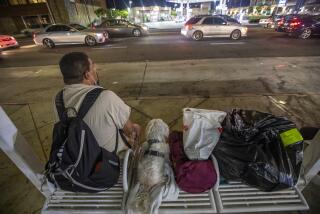Battle lines are drawn over lucrative traffic fines
In an emerging high-stakes battle fueled by government budget woes, a Long Beach lawmaker is attempting to stop cities from launching what she calls a “raid” on state coffers by collecting and keeping traffic fines.
With some tickets now costing more than $500 -- and with most of the money going to the state and the courts -- California municipalities in small but growing numbers have begun issuing traffic citations under their own laws, rather than under the state vehicle code.
Some local officials see it as a winning tactic that allows them to reduce penalties for the public while boosting cash flows because their agencies keep all of the money.
Los Angeles City Councilman Dennis Zine called this week for the state’s largest city to pursue such a program for red light tickets and possibly other moving violations.
Tens of thousands of red light tickets are issued annually in Los Angeles via photo enforcement systems. Those fines could be cut to $250 or less under his plan, Zine said. And the city -- which is grappling with a $212-million budget shortfall, the prospect of layoffs and potentially significant service cuts -- could collect millions in new revenue. The city would process tickets itself, outside of traditional traffic court, and net $50 to $100 more per citation.
But Democratic State Sen. Jenny Oropeza (D-Long Beach) is moving to halt the practice before it spreads. Under a bill she introduced earlier this month, cities would be prohibited from setting up their own traffic ticket fine schedules and collection systems.
Allowing a patchwork of enforcement practices would be “confusing, unfair and robs the state of legitimate income,” said Oropeza, a member of the Senate Transportation and Housing Committee. “I view it as a raid on state resources that are for transportation.”
Issuing different kinds of tickets for the same violation, with different fines, is “moving toward a situation of chaos,” she said.
At least one Northern California town, Roseville, has been issuing traffic tickets under city codes for about a year. Officials told the Sacramento Bee that for certain violations, such as failing to obey traffic signs, police have the option of issuing city citations or state code violations. More serious speeding or red light violations are not issued under local codes.
The city fine is $100, or about one third the penalty for the same violation cited under state law. Also, tickets issued under the aegis of the city are not reported to the state Department of Motor Vehicles or indirectly the driver’s insurance company.
That’s a major problem, Oropeza said. Uniform enforcement of the state vehicle code and keeping track of all moving violations are critical to identifying unsafe drivers, she said.
Among cities issuing traffic tickets under their own laws are Long Beach, Riverbank near Modesto and a few in the East Bay area, according to a spokesperson for Oropeza.
The potential financial losses to the state and courts aren’t yet clear, said Philip Carrizosa, spokesman for the agency that oversees administration of the state judiciary, which normally processes traffic tickets.
Some penalties have increased sharply in recent years, and the revenue stream is becoming increasingly attractive to elected officials struggling with huge budget deficits. Gov. Arnold Schwarzenegger recently estimated that the state could raise $338 million if cameras were used to catch highway speeders.
From Los Angeles County, the state and courts are reaping tens of millions of dollars a year, just from red light camera tickets, government records show.
Zine, a former Los Angeles Police Department traffic officer, said Los Angeles would report any moving violations to the state under his plan.
And cities should be able to set and collect traffic fines as they deem appropriate, he said, especially when they are providing the police and equipment to enforce laws and issue violations.
“We do all the work and they take the money. It’s absurd,” he said. And fines should reflect a community’s economic conditions, he added.
“Why should someone who’s receiving financial assistance pay these $500 tickets, when they can’t even pay the rent and put food on the table?”
Zine disputed the suggestion that Los Angeles and other cities would be raiding the state treasury. For years, state officials have been grabbing local government funds to balance their budgets, he said. “The state has ripped off every dollar they can” from cities.
On Friday, he introduced a motion asking the City Council to oppose Oropeza’s bill. He also said he will try to rally the state’s various city associations to fight her legislation.
More to Read
Sign up for Essential California
The most important California stories and recommendations in your inbox every morning.
You may occasionally receive promotional content from the Los Angeles Times.










